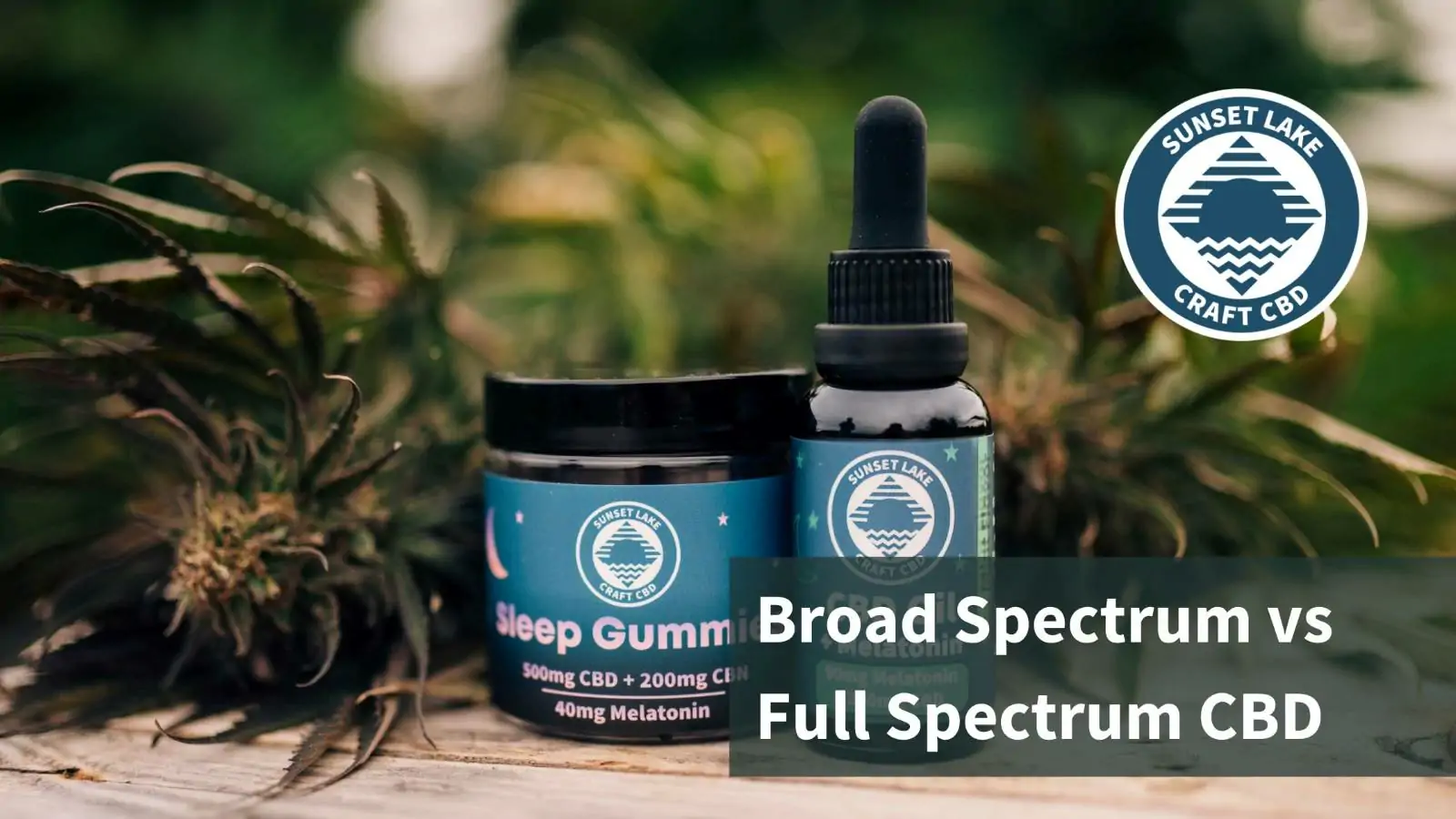No products in the cart.
Broad-Spectrum vs. Full-Spectrum CBD

Key Takeaways:
- Full-spectrum CBD contains trace amounts of THC. Broad-spectrum CBD contains no THC whatsoever.
- Full-spectrum CBD and broad-spectrum CBD can both provide users with the entourage effect.
- Broad-spectrum CBD is often more costly than full-spectrum because it requires additional processing to remove the THC.
Table of Contents:
If you’re determining which CBD product would be a good fit for you, you’ll want to learn the distinction between full-spectrum CBD vs. broad-spectrum CBD. By the end of this post, you’ll understand the differences between the two, where they come from, and why they might be priced differently.
Full-Spectrum Vs. Broad-Spectrum CBD: Which Is Right For You?
The difference between full-spectrum CBD and broad-spectrum CBD is slight; some might even say molecular, but it is still significant. Before we dive into it, let’s back up a step and review the classes of beneficial compounds produced by hemp plants.
Cannabinoids
Cannabinoids are a special class of compounds produced by hemp and cannabis plants that directly interact with our body’s endocannabinoid system.
CBD is one such cannabinoid that our farm specializes in. Other cannabinoids include CBN, CBG, THC, and more. According to the entourage effect hypothesis, when consumed, these cannabinoids work together to help regulate our endocannabinoid systems more efficiently. More on that shortly.
Terpenes
Terpenes are aromatic organic compounds responsible for the fragrance of hemp and cannabis. Some terpenes, like pinene and linalool, are being studied for their therapeutic benefits.
Flavonoids
Flavonoids are found in plants, including everyday fruits, vegetables, and hemp and cannabis flowers. Like terpenes, flavonoids may have some therapeutic applications, too.
What is Full-Spectrum CBD?
Full-spectrum CBD, also known as whole-plant CBD, contains all of the cannabinoids present in the hemp plant at the time of harvest. That means that full-spectrum CBD contains trace amounts of THC and THCa.
Containing trace amounts of THC isn’t necessarily a bad thing. In fact, THC is an important cannabinoid with regard to the entourage effect. Not only do CBD and THC work better together, but some people believe that full-spectrum CBD products offer more potent relief than CBD taken in isolation.
Hemp Flower Contains Full-Spectrum CBD
CBD hemp flower is the least processed hemp product on the market and is full-spectrum. While geneticists breed hemp with different cannabinoid profiles, there’s currently no way to completely breed out any cannabinoids, making them, by default, full-spectrum.
If you’re looking for a true full-spectrum experience, you may want to consider creating your infusion using raw hemp flowers.
Pros of Full-Spectrum CBD
So, why would you want to pick a full-spectrum CBD product? There are a few reasons.
- Entourage Effect— Full-spectrum CBD is whole-plant CBD, meaning that it has not had anything purposely removed. It contains all of the cannabinoids present at harvest, which may provide some therapeutic benefit.
- Availability— Because full-spectrum CBD requires less processing than other forms, it’s more widely available in-store and online.
- Price— The price of full-spectrum CBD is related to its availability. Again, because it’s so abundant and relatively easy to produce, full-spectrum CBD products are usually less expensive than their broad-spectrum counterparts.
Cons of Full-Spectrum CBD
Just as full-spectrum CBD presents some benefits, there are also some drawbacks. They include:
- THC— Full-spectrum CBD contains trace amounts of THC and THCa. If you’re still subjected to workplace drug tests or think you may have to take one as part of an interview process, we recommend avoiding full-spectrum CBD.
- Side Effects— Some folks are more sensitive to other cannabinoids like THC and CBN. The former is responsible for cannabis’s psychoactive effects, and the latter may make you quite sleepy. If that’s not what you’re looking for in your CBD product, you may want to avoid full-spectrum CBD products.
- Taste— Some products made with full-spectrum CBD extract can have a more hemp-y flavor than other manufactured products.
What is Broad-Spectrum CBD?
Broad-spectrum CBD is a hemp extract that contains no THC whatsoever. By definition, broad-spectrum CBD can contain just two cannabinoids, CBD and another, or all cannabinoids except THC, and any combination in between.
There are two ways to make broad-spectrum CBD:
- The first involves starting with CBD isolate and adding desired cannabinoids, flavonoids, and terpenes until you reach a desired balance.
- The second way to make broad-spectrum CBD involves removing THC and its isomers from the rest of your hemp extract via one or a combination of three different chromatography methods.
Pros of Broad-Spectrum CBD
Just as with full-spectrum CBD, broad-spectrum does offer some unique benefits:
- No THC— The biggest advantage of broad-spectrum CBD is that it contains no THC at all. You would want to confirm with third-party testing, but if you’re subject to THC testing, you should be able to use broad-spectrum products.
- Taste— A lot of broad-spectrum products, especially those made with cannabinoids added together, should taste better than their full-spectrum counterparts.
- Manufacturing Ease— Making products with broad-spectrum CBD is usually easier than using full-spectrum CBD.
Cons of Broad-Spectrum CBD
Some of the cons of broad-spectrum CBD are:
- Additional Processing— Removing THC from the equation requires more processing. While the process is safe, tried, and true, making broad-spectrum CBD does require more work than full-spectrum CBD.
- Price— The processing described above requires more intricate machinery, time, and labor, all of which will make your broad-spectrum CBD products more expensive than a full-spectrum option.
- Entourage Effect—Because some cannabinoids are absent in Broad-spectrum products, they may not offer the same potent effects as full-spectrum CBD products.
Note that this post was originally published on November 3, 2020 and was updated by the author on October 23, 2024
